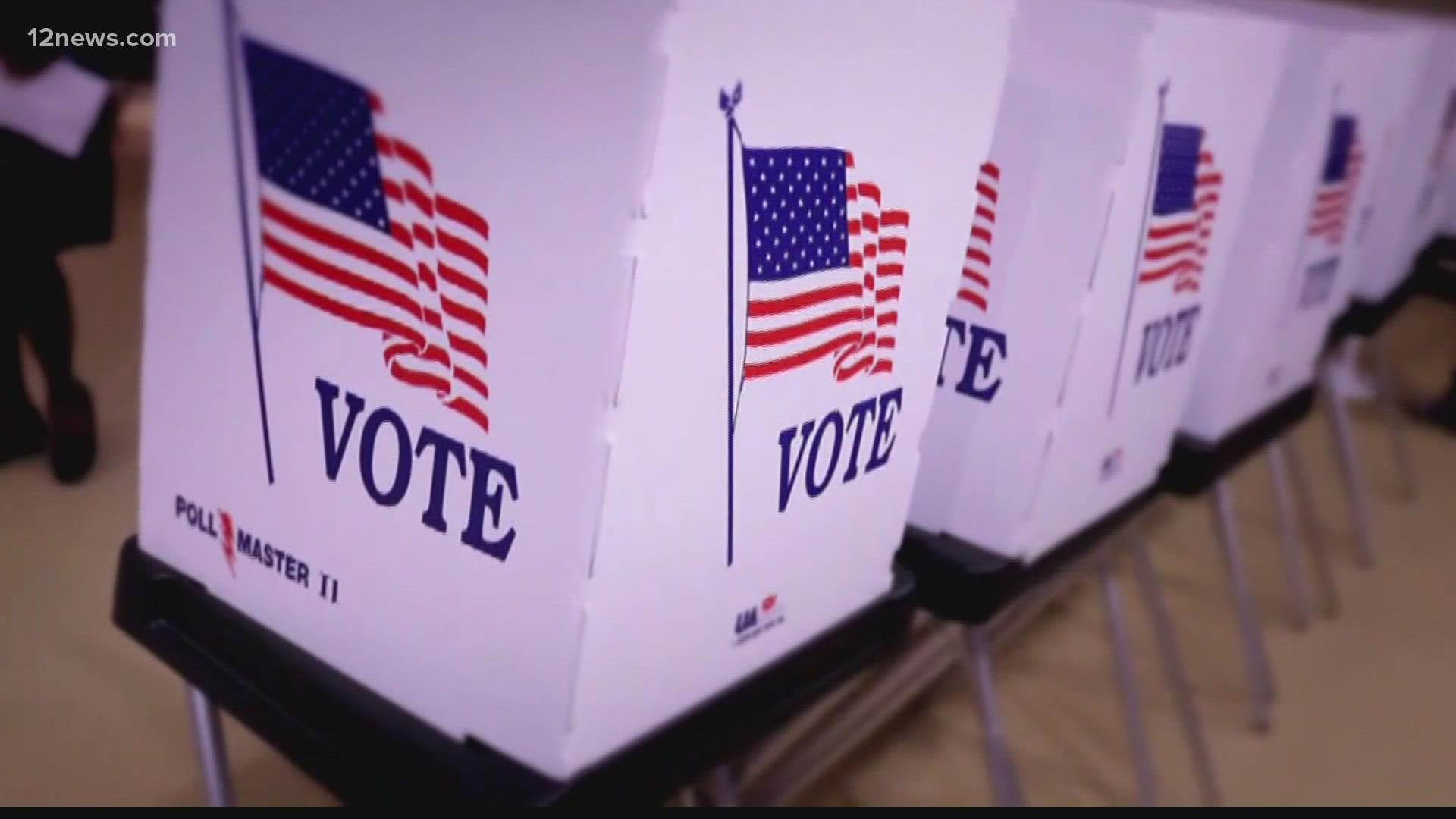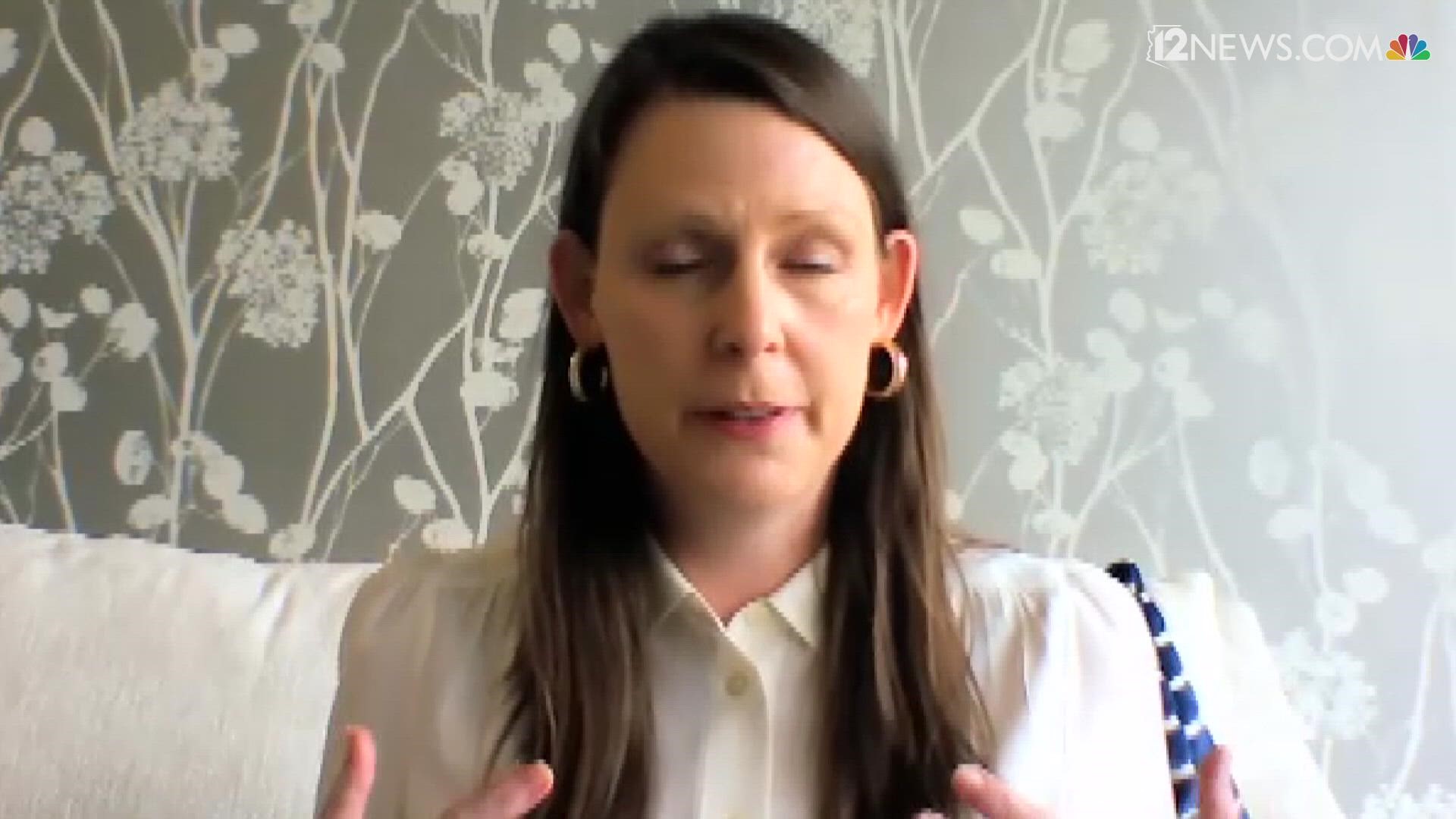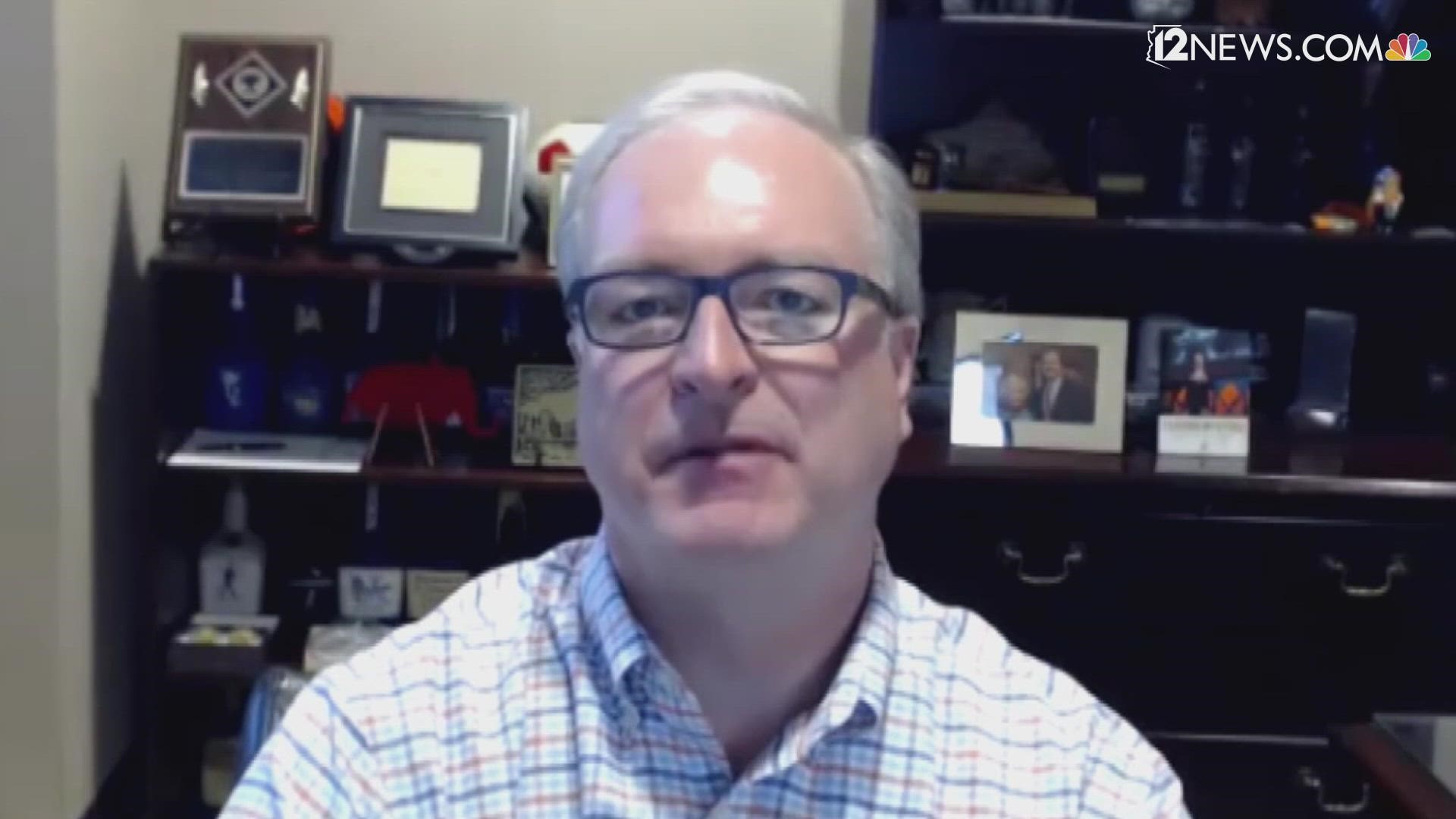ARIZONA, USA — Pundits and politicians are using the Cyber Ninjas partisan “audit” in Arizona to propagate a false claim that there were 57,000 “questionable ballots” cast in the 2020 presidential election.
Arizona Senate President Karen Fann retweeted a video by a Fox News pundit alleging “the mainstream media” ignored that there are “57,000 questionable ballots in Maricopa County”.
QUESTION
Were there 57,000 questionable ballots cast in Maricopa County in the 2020 election?
OUR SOURCES
- The non-partisan Brennan Center for Justice, a nonprofit organization that identifies problems with elections.
- The bi-partisan States United Democracy Center, an organization that works to ensure U.S. elections are secure.
- Dr. Barry C. Burden, Director of the Elections Research Center at the University of Wisconsin-Madison
- The Maricopa County Recorder’s Office
- Cyber Ninjas “Maricopa County Forensic Election Audit”
WHAT WE FOUND
This statement is FALSE.
The “questions” documented by Doug Logan of the Cyber Ninjas in his report to the Arizona Senate pertain to issues that credible election officials, from both parties, have provided logical explanations for.
While law enforcement may find isolated incidents of illegal voting, as is often the case in elections, Cyber Ninjas have provided no evidence to suggest there was widespread double-voting, illegal voting or fraud in the election.
Where the “57,000” claim originates
The phrase “57,000 questionable ballots” originates from the Cyber Ninjas report that concluded there were “57,000 ballots impacted” by several alleged anomalies. Let’s focus on the three largest allegations that make up the bulk of the number, “57,000.”
False allegation 1: 23,000 mail-in ballots voted from “prior addresses”
The largest group of ballots that Cyber Ninjas questioned are 23,344 votes cast under voter registration IDs for people that may not have received their ballots by mail because they had moved before the election. Cyber Ninjas asked whether this meant people could have illegally voted or double-voted.
Republican Trey Grayson of the States United Democracy Center is a former Kentucky Secretary of State and former Chair of the Republican Association of Secretaries of State. Grayson analyzed the Cyber Ninjas report and says the Cyber Ninjas’ methods to reach this conclusion were flawed.
“It’s bias and incompetence,” Grayson said.
Cyber Ninjas came up with the list of people they claimed moved houses by comparing the addresses of mail-in ballots to a commercial address list known as Melissa.
Grayson and Dr. Burden both discussed the Melissa database and noted that it ties people to multiple addresses for many reasons that may have nothing to do with where they actually live, such as DMV registrations, business locations and vacation homes. In addition, some mail-in voters, such as military service members, use a mailing address for their voter registration even though they don’t physically live there.
Experts also noted that comparing the Melissa list to a voter registration list for the purpose of an election audit is not a reliable strategy to identify potential fraud.
“A tool like the Melissa database, in theory, could be helpful before an election if you wanted to try to do some list maintenance. But afterward, it’s so much noise,” Secretary Grayson said. “I think to draw a conclusion to say ‘oh we found ten thousand questionable names in a database,' I think that does a disservice to raise that as a red flag, to say that therefore you shouldn’t have confidence in this election.”
Maricopa County officials add in a written response to the allegation: “We have reviewed hundreds of the voter IDs provided in the (Cyber Ninja’s) report… and found no instances a voter illegally voted from a prior address.”
In addition, the State of Arizona is a member of the national Electronic Registration Information Center (ERIC). The nonprofit is designed to improve the accuracy of voter rolls and identify potential fraudulent votes.
“It’s important to remember this is an entire system and there are safeguards every step of the way to prevent problems, detect problems and then report problems to the appropriate authorities in the event they are discovered,” said Liz Howard of the Brennan Center for Justice.
WATCH MORE FROM LIZ HOWARD HERE:
False allegation #2: “10,342 potential voters that voted in multiple counties”
The next largest batch of so-called “impacted ballots” involves “potential voters that voted in multiple counties.”
Cyber Ninjas concluded people could have voted in more than one county because more than ten thousand voters in Maricopa County shared the same first, middle, last name and birth year of other registered voters either in Maricopa County or in other counties across Arizona.
Cyber Ninjas wrote, "while it is possible for multiple individuals to share all these details; it is not common, and this list should be fully reviewed.”
What the Cyber Ninjas does not mention is that a process is in place to identify potential double-registrants. The list is scheduled to be reviewed after the election, per ERIC protocol. Arizona counties are in the process of reviewing these voters. As a result, two cases of potential fraud have been submitted to the Arizona Attorney General’s Office for criminal investigation, according to the Arizona Secretary of State.
Additionally, Maricopa County says their initial review of this claim by Cyber Ninjas turned up no instances of fraud and that the (Cyber Ninjas’) analysis… “resulted in false duplicates statewide” and that, “All voters reviewed were eligible to cast a ballot.”
A spokesperson for the Brennan Center for Justice adds that this finding by Cyber Ninjas reflects a “failure to comprehend basic probability and patterns of name popularity” in a given state.
“There are a lot of people named John Jackson and Joseph Smith who are both born in the year 1968 so it wouldn’t surprise me if there are a lot of false positives and the report doesn’t do anything to suss out false negatives and false positives which is an important part of record linkage,” said Dr. Barry Burden of the States United Democracy Center.
Both the Brennan Center for Justice and the States United Democracy Center agree it is misleading to consider these ballots “questionable” or “impacted.”
WATCH MORE FROM TREY GRAYSON HERE:
False allegation 3: “More ballots returned by voters than received”
Cyber Ninjas make another big claim, arguing there is evidence voters received one mail-in ballot but may have cast two ballots, potentially impacting 9,041 ballots.
The Maricopa County Recorder’s Office says this inference by the Cyber Ninjas is the result of the Cyber Ninjas either ignoring or not understanding election protocols during the curing of questionable signatures or blank envelopes.
Curing is the process where the election department helps voters fix mistakes so their votes count. During that process, more than one copy of an envelope may be created. But that doesn’t equal more than one vote. Our experts say the Cyber Ninjas erroneously confused copies of envelopes with potential double votes.
“Cyber Ninjas has no election experience and they are not familiar with routine election procedures and that ignorance was reflected in the report,” said Liz Howard of the Brennan Center for Justice.
The county added that “a preliminary review of voters from the (Cyber Ninjas) data found no evidence of double voting.”
Other allegations: out-of-state voters, voters with incomplete names, and deceased voters
There are other allegations made by Cyber Ninjas regarding alleged anomalies. The Brennan Center for Justice and States United Democracy Center say they have reviewed those claims as well and found that the “questions” the Cyber Ninjas raised have credible, logical answers.
”These questions are pretty easy to answer if you are doing it with good intentions, if you are really trying to build trust in election administration, or if you are really trying to identify election problems and doing it in good faith,” Secretary Grayson said.
In the States United report, Dr. Burden and Grayson noted that the Cyber Ninjas “audit” is unreliable for another reason: Doug Logan already expressed his opinion the election was stolen months before conducting the “audit”. In addition, funders of the audit who sent millions of dollars to Logan’s firm supported conspiracy theories suggesting Trump actually won.
“There are lots of reasons to be skeptical of any findings from the Cyber Ninjas and their collaborators,” Dr. Burden said. “Really all the hallmarks of a good audit and an election review are not present.”
“They also have a lack of knowledge, a lack of experience and a lack of competence,” he said.
Arizona Politics
Get the latest Arizona political news on our 12 News YouTube playlist here.



